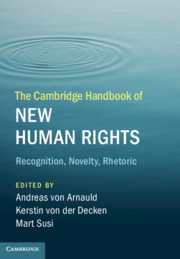Book contents
- The Cambridge Handbook of New Human Rights
- The Cambridge Handbook of New Human Rights
- Copyright page
- Contents
- Figures
- Contributors
- Acknowledgements
- Introduction
- Part I Cross-Cutting Observations
- Part II Public Good Rights
- Part III Status Rights
- Part IV New Technology Rights
- The Right to Internet Access
- The Right to Be Forgotten
- Reproductive Rights
- Genetic Rights
- 26 The Relevance of Human Rights for Dealing with the Challenges Posed by Genetics
- 27 The Challenge of Genetics
- Part V Autonomy and Integrity Rights
- Part VI Governance Rights
- Index
27 - The Challenge of Genetics
Human Rights on the Molecular Level?
from Genetic Rights
Published online by Cambridge University Press: 04 January 2020
- The Cambridge Handbook of New Human Rights
- The Cambridge Handbook of New Human Rights
- Copyright page
- Contents
- Figures
- Contributors
- Acknowledgements
- Introduction
- Part I Cross-Cutting Observations
- Part II Public Good Rights
- Part III Status Rights
- Part IV New Technology Rights
- The Right to Internet Access
- The Right to Be Forgotten
- Reproductive Rights
- Genetic Rights
- 26 The Relevance of Human Rights for Dealing with the Challenges Posed by Genetics
- 27 The Challenge of Genetics
- Part V Autonomy and Integrity Rights
- Part VI Governance Rights
- Index
Summary
The editor of a groundbreaking book that explores the normative challenges posed by the recent advances of genetic research, Sheila Jasanoff, provides in her introduction a very powerful metaphor for describing what has happened in the field of genetics since the completion of the Human Genome Project. She claims that biological sciences have reached the phase of textuality. By this she means that, just like DNA sequences, genetic test results can also be written, recorded, stored, read and matched with other textual and non-textual information. She argues that this post-genomic period provides a transformative change in both law and the life sciences that should be considered ‘bioconstitutional’. Since the completion of the Human Genome Project in 2003, new legal challenges have emerged and law and ethics have provided two different kinds of responses to the legal challenges that have been accelerated following the completion of the Human Genome Project. One applied a ‘rhetoric of scepticism’ and vehemently argued that ‘there is nothing new, nothing special’ about genetic research and genetic data, while the other position emphasised novelty and the peculiarity of genetic data. From these two radically different approaches, two substantially different legal conceptualisations follow. The first does not see any necessity to adopt new legal norms or formulations of new human rights in the field of genetics. The other approach argues that new legal norms need to be articulated, including new human rights.
- Type
- Chapter
- Information
- The Cambridge Handbook of New Human RightsRecognition, Novelty, Rhetoric, pp. 350 - 358Publisher: Cambridge University PressPrint publication year: 2020



